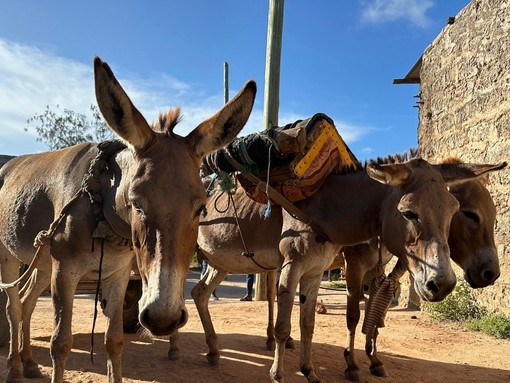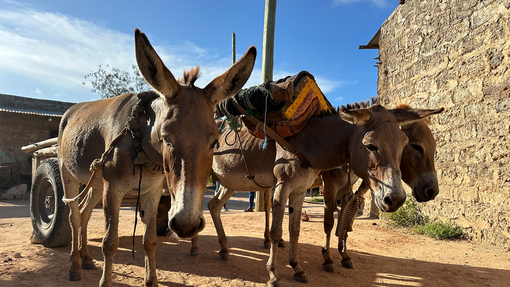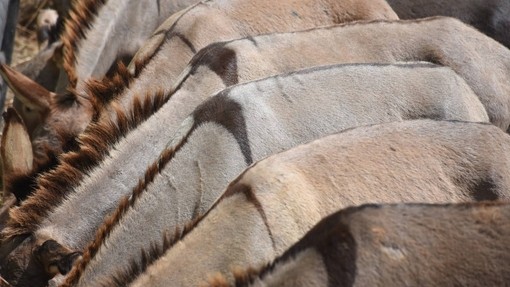
Kenya's stolen donkeys
In the wake of the landmark decision by the African Union in February to ban the slaughter of donkeys for their skins, our greatest challenge now lies in implementing and enforcing a continent-wide welfare plan for Africa that realises these promises.
Donkey owners in Kenyan communities have spoken out about the impacts of losing their donkeys to skin traders looking for a supply of donkey skins at any cost.
As sales of ejiao, a gelatine used in cosmetics and supplements around the world, has rocketed so has the need for donkey skins to meet demand. High demand and high prices for skins has fuelled the theft of donkeys from communities across Africa, from people who depend upon their donkeys for their livelihoods.
The terrified creatures may be sold onto a donkey slaughterhouse, where they often face inhumane slaughter methods, or are cruelly butchered in the bush, their skins removed to supply the demand for the donkey skin trade.
Donkeys suffer in appalling conditions as their populations face decimation, and The Donkey Sanctuary continues its fight against the devastatingly cruel global trade in donkey skins.
Stolen in the night
Located around 17km south of the Kenyan capital Nairobi, Ongata Rongai is a town where many residents rely on their working donkeys to survive. The incomes they earn may be meagre, but allows them to feed and support their family, pay rent, and send their children to school.
Ongata Rongai resident Wycliff Wereva has worked with his donkeys for more than ten years, earning a living to support his family by ferrying clean water and building materials around the community.
Yet during this time, Wycliff has lost six donkeys to donkey thieves, which he believes have been taken to the donkey slaughterhouse facility in Naivasha, some 100km north, where they were killed for their skins.
“The first donkey I had, someone stole it, and it was slaughtered.” Wycliff explained. “I struggled to buy another one, but when I did the same thing happened again. I have lost six donkeys in that way.
“I am a family man,” he continued. “I need to feed my family, and my children need to go to school. Now I am unable to provide for them, and my children are at home as I cannot afford to pay for their education.
“My life is hard and hopeless. My donkey cart had water jerry cans. The jerry cans have all been stolen. The cart just stays here, and I should be earning from it.”
Now Wycliff has taken the decision to hire a donkey, and to ensure its safety, has taken to keeping it inside his property to protect the animal from thieves.
He continued: I even have to let the donkey sleep in the house compound with my family due to increased theft, because if I leave it outside and it’s not my donkey, I will have to pay for it (if it’s stolen) and I cannot afford that.”
“Donkeys are everything to me”
Another resident of Ongata Rongai has spoken about how donkey theft has been affecting the education of his children.
Like Wycliff, Fredrick Otieno has been earning a living through his donkeys for more than a decade. He uses a donkey to pull a cart, ferrying goods into town and to carry water. His donkey provided for everything and has been his daily livelihood.
Fredrick explained: ‘Since my donkey was stolen and slaughtered, it has been really hard. One of my children is now at home as I have been unable to pay school fees.
“I haven’t been able to pay my rent for four months. I can’t even explain it, I’m very stressed. Donkeys are everything to me”.”
Fredrick had also taken out a loan to buy a motorcycle, but after his donkey was stolen, he couldn’t afford the repayments, and the bike was repossessed.

Like others he’s relied on hiring a donkey, but they are not always available. This means he sometimes has to resort to taking the position of the donkey himself and pull his cart by hand. It is the only way he can earn a living.
Offering advice to other donkey owners Fredrick said: “Take care of your donkey, and even build shelters if need be. Not every place is safe, be alert and cautious.”
Wycliff Wereva added: “It would be helpful if the slaughterhouse (in Navaisha) was shut down. Maybe that would have saved a lot of donkeys.”
Until the demand for donkey skins rescinds, communities, such as those in Ogata Rongai will continue to suffer the fate of losing their donkeys to this brutal trade, and individuals like Wycliff and Fredrick, and their families, will suffer.
Dr Solomon Onyango, Director of The Donkey Sanctuary Kenya said, “The skin trade is a disaster for donkey welfare, but we are also devastated to see the impact on communities in Kenya, forcing them to sink further into poverty. This is something we are working on globally as part of the Sustainable Development Goals to safeguard this cherished animal and recognise the role they play in providing a lifeline and livelihood.
Share this page
Tags
- News



